Colds in children under one year old are quite common, so mothers should not lose their vigilance and clearly understand what needs to be done in different situations. When found in 6- month old baby signs of malaise, you should not console yourself with the fact that the baby is teething, since in almost a hundred percent of cases it is a viral infection. Cutting teeth lower the immunity of children under one year old, and allow the disease to penetrate into the child's body.
Treatment of babies under one year old cannot be postponed to avoid complications. At the first signs of the disease, rubbing and compresses with the use of a special children's ointment "Doctor MOM" or a balm "Doctor Theiss" will help. Balm and ointment include camphor, eucalyptus, nutmeg and coniferous oils. These drugs can also be used after accidental hypothermia for prevention purposes.
The term "cold" refers to diseases that have arisen after hypothermia against a background of reduced immunity. Treatment of colds, which include: ARVI, acute respiratory infections, flu, runny nose and, up to 12 months old, has its own subtleties and characteristics. The fact is that almost all medications are contraindicated for a child under 1 year of age, in addition, a baby of several months old cannot blow his nose or gargle on his own.
In order to avoid the frequent occurrence of a cold in a child under one year old, parents need to increase his immunity... For prophylactic and therapeutic purposes, drugs such as interferon and influenza are used. For children under six months of age, drugs are instilled into a nose 1 drop 2 times a day, and at an older age - 2 drops 3 times a day. For the prevention of colds and flu, children after the 7th month are recommended to give anaferon for children, the tablet of which dissolves in a spoonful of heated water and is given to the baby. The most relevant use of the above preventive drugs becomes during flu epidemics, especially if a sick person has already appeared in the house.
A runny nose is the first sign of the disease
The onset of colds is most often accompanied by a runny nose. In case of a runny nose, children under one year old should clean the nose with cotton wicks soaked in soda solution before feeding. After cleaning, it is recommended to drop a drop of breast milk, which contains the necessary protective substances, into each nostril. If the baby is bottle-fed, you can use warm vegetable oil for this purpose. However, doctors warn that a pear should not be used during such procedures, since an excessive amount of liquid can enter the ear and provoke otitis media.
Simple and effective remedy from a cold is aloe juice diluted with water, which is instilled into the baby's nose 3 times a day, four drops. A good result is provided by such a natural remedy as lemon and honey juice (from 11 months), mixed in equal parts. Cotton swabs are moistened in the prepared solution and inserted into the nose for a while, or the product is directly instilled into the child's nose, two drops each. It is not recommended to use vasoconstrictor drops.
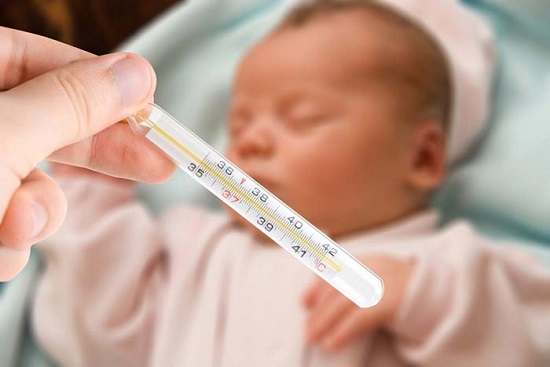
After the baby reaches the age of nine months, and at a low temperature, the child can steam the legs. First, the legs are lowered with warm water, and then hot water is carefully poured into it, until the temperature reaches forty degrees. As soon as the legs turn red, they are doused cold water, after which they are again lowered into hot water. The procedure should be repeated three times. Then the baby needs to put on warm socks and put to bed.
To treat a runny nose in young children, ointments that do not contain menthol, which are prescribed for babies only over three years old, will help. Treatment for colds, and in particular a runny nose and cough, can be carried out with the help of Pulmex Baby ointment, indicated for use in children under one year old. The ointment contains eucalyptus and rosemary essential oils, and is used as an adjunct to the drugs prescribed by a specialist. This ointment can be used after the baby reaches six months of age. A small amount of ointment should be rubbed over the skin on the baby's chest and back, and then covered with a cotton cloth. Children's ointments for colds and flu are also used as a preventive drug.
The first thing that parents of babies who have a cold need to take is to call a doctor, regardless of the severity of the symptoms of the disease. Moms and dads should be aware that even a runny nose can be a serious danger, especially if a month-old baby is sick. A well-known recommendation is to drink plenty of fluids. A child under one year old with colds should be given rose hips, tea with lemon or compotes to drink as often as possible.
The baby's pillow should not be low, as this creates a risk of suffocation. The air in the room where infant, cannot be excessively dry. When coughing, it is recommended to rub the chest, back, feet and lower legs with a balm or ointment with eucalyptus. The temperature is over 38 degrees, in children under one year old it gets confused with a vinegar solution, which is used to wipe the baby's skin. The recipe for this product is very simple: vinegar is diluted at the rate of a tablespoon per liter of water. Water with vinegar can also be used for babies who are just one month old.
If a cold is not accompanied elevated temperature, pediatricians do not recommend treating a child, say, four months of age, with various medications. For these purposes, it is better to use simple natural products, such as saline drops or warmed milk with a little butter. Wrapping a 4 month old baby can lead to overheating, so you should never do this.
Throat treatment in children under one should be carried out under medical supervision. You should not even use local antibacterial medicines on your own. It is good for a four-month-old baby to give chamomile tincture, one spoonful 3 times a day after meals. The best disinfectant for babies who are one month old is mother's milk. The neck of the baby will pass faster if you give him the breast more often.
For colds, inhalation is also good. In a closed room next to the baby's crib, you need to put a pan with a hot solution for inhalation. It is better if the child breathes these pairs for an hour and a half. You can also put crushed garlic at the head of the bed.
Rinsing the nasal cavity will protect the baby from viruses
Parents should not underestimate the danger of SARS, acute respiratory infections or flu, which can turn into pneumonia or bronchitis. Based on this, the main task of the child's relatives is to prevent colds, than to treat them later. Proven folk methods will help to protect the baby.
Based on the fact that the baby's nose is the first to be attacked by viruses, it should be washed from harmful microbes, mucus and dust. Babies up to one year old should be washed twice a day with specially designed saline solutions... In addition, freshly squeezed Kalanchoe juice perfectly cleans the nose. One or two drops are instilled into each nostril, causing a sneeze that cleans the nasopharynx perfectly.
Every person regularly encounters a runny nose, since this symptom can accompany a huge number of different diseases. Six-month-old babies are no exception. Due to the peculiarities of immunity, babies under the age of one year are incredibly susceptible to the effects of pathogenic microorganisms, as a result of the reproduction of which a runny nose can occur. In addition, acute coryza in a small child can occur for other reasons.
Treatment of a cold in a child at 6 months is complicated by the fact that the baby is not yet able to blow his nose on its own, which means that the slimy secret does not leave his body. In this article, we will tell you how and how to properly treat a runny nose in a child at 6 months, in order to free his respiratory tract from mucus infected with microbes and to get rid of this unpleasant symptom as soon as possible.
How to treat a runny nose in a baby at 6 months?
First of all, for effective treatment a runny nose in a six-month-old baby, it is necessary to moisten the mucous membrane of his nose with the help of ordinary saline solution or drops based on sea water, for example, Aqualor for children or Aquamaris. After about 1-2 minutes, the nasal passages must be cleaned of mucous secretions using a special aspirator with replaceable nozzles Otrivin Baby.
Although there are quite a few other nasal suction systems for infants, the vast majority of pediatricians agree that this is the best aspirator.
To relieve swelling, apply vasoconstrictor drugs, for example, Vibrocil or Xilen. It should be borne in mind that for the treatment of children at the age of 6 months, drugs in the form of a spray cannot be used, therefore it is necessary to purchase drops with a vasoconstrictor effect. 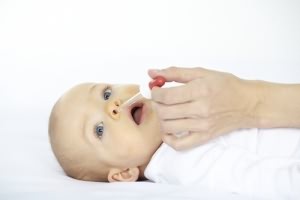 Such drugs can provoke many side effects, therefore, before using them, you should definitely consult your doctor.
Such drugs can provoke many side effects, therefore, before using them, you should definitely consult your doctor.
In addition, if the doctor, as a result of the examination, determines that the cause of rhinitis lies in the viral lesion of the child's body, he may additionally prescribe the use antiviral agents, for example, Grippferon or Interferon. If a runny nose is a manifestation of an allergic reaction, antihistamine drops such as Fenistil or Zyrtec can be used.
How can a runny nose be treated in a 6 month old child?
How to treat a runny nose in a child 6 months old? This question worries many parents. A runny nose is an inflammation of the nasal mucosa. This ailment occurs due to viruses or various microbes, hypothermia of the body, dustiness and gas pollution of the air. The first symptoms include dryness in the nasopharyngeal cavity, as well as a burning sensation. Then there is abundant mucous discharge.
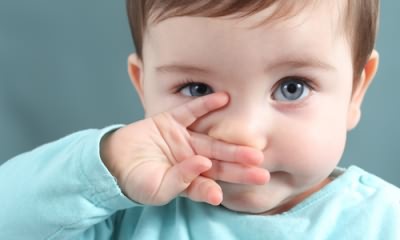
Features of the common cold in children
From the moment a newborn baby appears in the house, parents have a lot of questions, especially with regard to the problems of caring for him. But complete panic arises in all family members when snot appears in a small baby. How to treat a runny nose in an infant? Parents, remember that you should go to your local doctor first. Only he is able to prescribe the correct and qualified treatment.
As soon as you find a nasal congestion in your baby, you will have to start immediately taking action to treat the common cold. This speed is due to the fact that the nasopharynx of a one-year-old child is not fully developed, and rhinitis can lead to great complications in the future. It is worth noting such a moment that a simple runny nose can easily develop into a chronic one, and in the future there will be a complication in the ears. And the child will end up with otitis media.
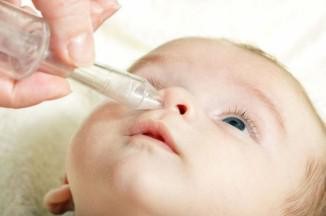 It happens that the newborn sniffs or has difficulty breathing. This problem may not be due to the fact that he has a runny nose. This rule especially applies to children under one year old, in whom nasal congestion is a physiological phenomenon. To quickly cleanse the nasal passages, it is necessary to carry out daily hygienic care. So do not rush to the pharmacy for drops, but try to clean his nose twice a day.
It happens that the newborn sniffs or has difficulty breathing. This problem may not be due to the fact that he has a runny nose. This rule especially applies to children under one year old, in whom nasal congestion is a physiological phenomenon. To quickly cleanse the nasal passages, it is necessary to carry out daily hygienic care. So do not rush to the pharmacy for drops, but try to clean his nose twice a day.
Young parents should remember that dryness in the nasal mucosa is unacceptable. But a small amount may be present.
Do not suffer from bigotry and do not go to extremes and be able to distinguish whether treatment is necessary or not.
We treat a runny nose in a six month old baby
How to cure a runny nose? Now medicine does not stand still, and constantly manufacturers are making new remedies for the treatment of rhinitis, not only for adults, but also for babies. Just remember that self-medication of babies at this age is categorically contraindicated, so contact your local pediatrician for help.
To make the right decision on the use of medicines in the nose for a six-month-old baby, it is necessary to take into account all the manifestations of rhinitis in him. If there is an increase in body temperature, then we can safely say that an inflammatory process has begun in the body, and for such a disease it is recommended to adhere to the home regimen and not bathe the child.
Drugs for the treatment of rhinitis in a baby
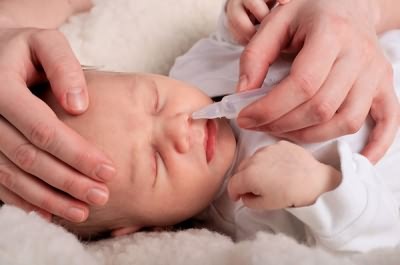 In such early age best remedy - drops, not sprays. You can drip your nose with drugs such as:
In such early age best remedy - drops, not sprays. You can drip your nose with drugs such as:
- Vasoconstrictor.
- Moisturizers.
- Antiviral.
- Antiseptic.
Taking the first group of medicinal drops for a baby is undesirable, mainly pediatricians prescribe them only if nasal congestion lasts more than three days. Basically, such vasoconstrictor drugs as "Nazol Baby" and "Nazivin 0.01%" are prescribed.
To remove viscosity and moisturize the nasal mucosa, medications based on sea water and saline are prescribed. Do not forget about such drugs as "Interferon" and "Grippferon", which are prescribed during viral rhinitis.
The most common remedy is "Nazol Baby". This is a special product that is intended for babies under one year of age. Available in a convenient bottle, it is recommended for children under 6 years of age. His doctors prescribe to patients when there is:
- runny nose due to a virus or bacteria;
- allergy;
- sinusitis and chronic rhinitis;
- acute otitis media.
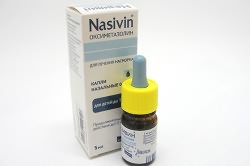 "Nazivin 0.01%" is prescribed during edema of the mucous membrane and infectious inflammation of the respiratory system. It should be noted that when allergic swelling of the nasal mucosa occurs, it is also often remembered about it.
"Nazivin 0.01%" is prescribed during edema of the mucous membrane and infectious inflammation of the respiratory system. It should be noted that when allergic swelling of the nasal mucosa occurs, it is also often remembered about it.
"Interferon" actively fights against viruses and bacteria that attack the child's body during seasonal illness.
"Grippferon" is considered an antiviral and immunomodulatory drug, which is prescribed during acute respiratory viral infections and seasonal colds. Doctors also recommend using it as a preventive measure.
"Aquamaris" is prescribed by pediatricians to children during acute and chronic rhinitis.
Aqualor is usually prescribed to patients who are diagnosed with influenza and acute respiratory diseases... The composition of such a medicine includes sea water.
Saline is used mainly for the manufacture medicines from a runny nose. Thanks to this remedy, mucus can be diluted, and breathing becomes instantly clear.
Saline solution, which is prepared based on sea \u200b\u200bsalt... Thanks to him, you can relieve inflammation, kill infection, soften dry crusts from a cold. To prepare this solution, you need to take 1 teaspoon of salt and dilute it in a liter of warm water. Many recommend using 1 teaspoon in a glass of water, but the above proportion is appropriate for an adult.
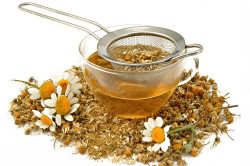 Chamomile is able to kill bacteria inside the nose and relieve inflammation. To do this, you need to prepare a decoction. Pour 1 tablespoon of flowers with a glass of water, boil everything thoroughly and let it brew for half an hour. After that, the broth can be used to cleanse the nose. Just strain it before use.
Chamomile is able to kill bacteria inside the nose and relieve inflammation. To do this, you need to prepare a decoction. Pour 1 tablespoon of flowers with a glass of water, boil everything thoroughly and let it brew for half an hour. After that, the broth can be used to cleanse the nose. Just strain it before use.
Dear caring parents, remember the one and only and most important rule that drops for instilling a small nose must be at room temperature and can be used only once every three hours.
"Naphtizin" and "Galazolin" are generally not recommended by pediatricians for such small children, as they first narrow and then expand the nasal mucosa. These drugs are prescribed when a child has severe, profuse nasal discharge. If there is simply congestion in the nose without any discharge, then such medications it is strictly forbidden to use, as in the future this will lead to the formation of necrosis and tissue ulcers.
Parents, remember that it is strictly forbidden to use the same drops for more than ten days.
They recommend changing them periodically. Sprays are not ideal for babies under one year of age because the sinuses are small and wide. And if you use a spray, otitis media can form as a result, since the medicine can get into the ear.
How to cure a runny nose for a 6 month old baby ???
Answers:
Diana
Found where to ask! To the doctor! \\ medic \\
olga
beet or carrot juice
Ekaterina Tarasova
if you are breastfeeding, then drip svre milk effectively helps! (most advised)
Laura ******
beetroot carrot or eloy juice ... just dilute with some water .. drip it all a couple of times and it will pass, and it is also desirable for you for the sake of prevention. but antibiotics are not allowed, you are talking to Lyalka ..
Someone's joy
there are droplets in the pharmacy PROTARGOL or COLLARGOL (something on silver). It is always prescribed for babies. It helps a lot. And he coughs because of a cold)))
Grigory Spichak
Sodium garlic, put in cheesecloth. And hang on a string around your neck. At night by the crib. To breathe ...
Just LANA
Treatment scheme for rhinitis (competent): 1. drip vasoconstrictor droplets, wait 10 minutes. 2. Salin (Aquamaris) and clean it with chopsticks) 3. Bury it with drops of a medicinal nature (Vitaon Lux oil should be cleaned with Salin (without vasoconstrictor) up to 6 times. I draw out mucus with my small enema pear. back wall nasal discharge accumulates in the pharynx. You can give him Chest Collection No. 1 (1 tablespoon each) and be sure to rub his chest and back with a warming rub (Badger or bear cub). You can drink vitamins, you can drink Anaferon. Call the doctor to listen to the baby. Good luck!
*** just me
derinat. he is from birth. for prevention, put garlic in the room on a plate.
° * Sun Ray * °
in alarmists, for every bunch to the doctor, if there is no temperature, and it does not get worse, why a doctor. You must be able to do something yourself. No vasoconstrictor drops needed! they will not solve the problem, but only remove the symptom for a short time! snot is also needed, it flushes germs, etc. from the nose! It is necessary to spread it with warming ointment - throat, chest, ears, wrapped in woolen and put to sleep, it will be fine if it's just a cold or something like that;)
By the way, you have not been vaccinated recently? ? from them maybe. - http://otvet.mail.ru/question/23852143/
Read, be careful and healthy:
Drink melt water, tested for yourself, the result is excellent - where melt water is called protium water. The method is as follows: Put an enamel pot with filtered or regular tap water in the freezer of the refrigerator. After 4-5 hours you need to get it out. The surface of the water and the sides of the pot are already covered by the first ice. We pour this water into another saucepan. The ice that remained in the empty pan contains molecules of heavy water, which freezes earlier than ordinary water, at +3.8 0C. This first ice containing deuterium is discarded. And put the pot of water in the freezer again. When the water in it freezes by two-thirds, we drain the unfrozen water - this is “light” water, it contains all the chemicals and harmful impurities. And the ice that remained in the pan is the protium water that the human body needs. It is 80% free of impurities and heavy water and contains 15 mg of calcium per liter of liquid. You need to melt this ice at room temperature and drink this water throughout the day.
There are also recipes for the external use of melt water. A healthy lifestyle enthusiast, folk inventor V. Mamontov, knowing about the special properties of melt water, invented a method of massage with melt water - “talitsa”. He added rock salt to the melt water, which contains all the vital trace elements, and a little vinegar and used this solution for massage rubbing into the skin. And the "miracles" began. Here is how he writes about it: “After several rubbing, the heart, constantly reminding of itself with tingling sensations, lumbago, sharp pains, stopped bothering me, the work of the stomach improved, sleep returned to normal. Veins began to disappear, with ropes and cords protruding earlier on the legs and arms. After the normalization of metabolism, the vessels that are close to the skin began to recover. The skin on the face and body itself became elastic, soft, tender, acquired a lively, natural color, wrinkles were noticeably smoothed out. Feet warmed up, old periodontal disease disappeared in a few days, gums stopped bleeding. "
A solution of "talitsa" is prepared as follows: 1 tsp. Is diluted in 300 ml of melt water. a spoonful of rock salt (preferably unrefined sea salt) and 1 tsp. a spoonful of table vinegar (better than apple cider or other fruit).
For baths oral cavity (in case of tonsillitis, diseases of teeth, gums, periodontitis) "talitsa" should be kept in the mouth for 10-15 minutes, carrying out several procedures a day for 7-10 days.
Water and massage procedures using the "talitsa" can be diversified, replacing in different water treatments ordinary water for "talitsa". Procedures with "talitsa" are generally available, do not require special equipment and preparation, have no contraindications, and give the body a general tone.
First you need to deal with clinical manifestations acute respiratory viral infection The child has. Here are the main signs of a cold in babies:
- tearfulness and anxiety;
- cough, nasal congestion accompanied by discharge;
- decreased appetite, refusal of milk;
- digestive disorders (more often diarrhea);
- possible small rash, enlarged lymph nodes;
- increased temperature, fever;
- the mucous membrane of the throat is inflamed.
Depending on the specificity of the viral infection, either the nasopharynx with a slight increase in temperature (rhinovirus infection) or the respiratory tract with manifestations of gastroenteritis (coronavirus infection) can be affected.
You should not be afraid so much yourself respiratory infectionhow many complications that may arise due to untimely or incorrect treatment when the clinical picture worsens. Possible complications include pneumonia, otitis media, laryngeal edema (croup).
Of course, it requires immediate action, but this does not mean at all that you need to panic.
Treatment
Let's talk about the measures that are advisable to take before the arrival of the doctor. It is he who will determine the course of treatment, based on the results of the examination. So, colds in infants are treated:
- if the temperature rises above 38 degrees, we urgently call an ambulance. Before the doctor arrives, you can apply wet wipes (the water temperature should be about 27-30 degrees). We do not add vinegar to the water, because, being absorbed through the skin, it has a slight toxic effect on the child's body. You can use paracetamol-based rectal suppositories, for example, Efferalgan - they have an antipyretic effect. Do not wrap the baby too warmly so as not to aggravate the fever;
- so that the waste products of pathogens leave the body faster, it is necessary to give the child as much fluid as possible. It is advisable to use solutions such as Regidron - they not only promote detoxification, but also restore the water-salt balance;
- if necessary, apply vasoconstrictor drops (now in pharmacies there is a fairly wide range of drops from the common cold, produced specifically for children, for example, Otrivin). A chamomile decoction has a good anti-inflammatory effect. It can be instilled several times a day, 2-3 drops in each nostril. The child is unlikely to be delighted with such a procedure, since such instillations cause a slight tingling of the nasal mucosa, however, the emphasis should be placed on anti-inflammatory treatment, and not on eliminating the effect with the help of vasoconstrictor drops. This is necessary so that he can drink, otherwise his nasal congestion will not allow him. However, you should not abuse such drops either - they develop a quick addiction. Since infants do not know how to blow their nose on their own, they will have to clean their nose with a special aspirator or a small rubber bulb;
- when coughing, it is advisable to use mucolytic syrups (to thin and better sputum discharge), such as Bronchikul, Tussamag or Dr. Mom. If the sputum flows normally, there is no need for such drugs. Moreover, pediatricians recommend using them only in the treatment of dry cough in children from 6 months. For example, a cold in a child for 2 months cannot be treated with such drugs;
- You don't have to choose your own medicine or rely on the recommendations of a pharmacist at a pharmacy. He cannot draw up an accurate clinical picture based on your explanations. Many drugs tend to depress the respiratory center by artificially suppressing the cough. And stagnation of phlegm in the bronchi is completely useless. Therefore, in the matter of choosing alternative medicines, you must trust an experienced pediatrician.
In the treatment of babies' colds, inhalations with tea tree or eucalyptus essential oils help well. However, it is not always possible to force an adult to undergo this procedure, and even an infant - even more so. Therefore, we use the "soft version" of inhalations: next to the bed (exactly next to, not above) we put a pot with the solution for inhalation, and gradually let out steam so that the child inhales at least some of it. Do not tilt it over a pot of hot water - this will only exacerbate stress, and it can also cause burns. Be extremely careful.
Preventive measures
Oddly enough, the prevention of colds in infants does not require the use of expensive pharmacological drugs. The best immune stimulant for a baby is breast milk. It contains enough antibodies to effectively ward off colds. Of course, this is not a panacea for all diseases, but among pediatricians, experts have long agreed that children who are on breastfeeding, get sick less often, and recover faster than children who are fed artificial formula.
It is very important that the child is regularly outdoors. Even in rainy or cold weather, it is necessary to take at least a short walk. It is important to remember that walks are advisable only when the child is healthy. If he already has a cold, preventive measures take late. The room must be regularly ventilated and wet cleaning done as often as possible.
The use of immunomodulatory drugs is allowed, but their choice must be made by a doctor. In most cases, these are drugs such as Aflubin or Grippferon.
A runny nose, accompanied by a profuse flow of nasal mucus and nasal congestion, is unpleasant for anyone. Especially this symptom of a cold bothers half-year-old children, since the anatomical features of the nasopharynx do not allow babies to simultaneously feed on breast milk and breathe. Due to the lack of nasal breathing, sleep is disturbed, the child loses his appetite, becomes capricious. The task of parents is to cure a runny nose in a child of 6 months as soon as possible, until the disease spreads to the lower respiratory tract, causing laryngitis or bronchitis.
Before starting treatment, you should visit the pediatrician's office for the correct diagnosis, since such a common phenomenon for us as a runny nose can be a symptom of various diseases, respectively, and the doctor's prescriptions will differ.
In infants under 3 months of age, there is often a phenomenon such as physiological rhinitis, caused by the fact that the baby's mucous membrane is not yet sufficiently formed and in the process of establishing its work, it can secrete excess mucus. It is not necessary to treat such rhinitis, the main thing is to properly care for the child's nose so that the mucus does not dry out, creating a good environment for the development of bacteria.
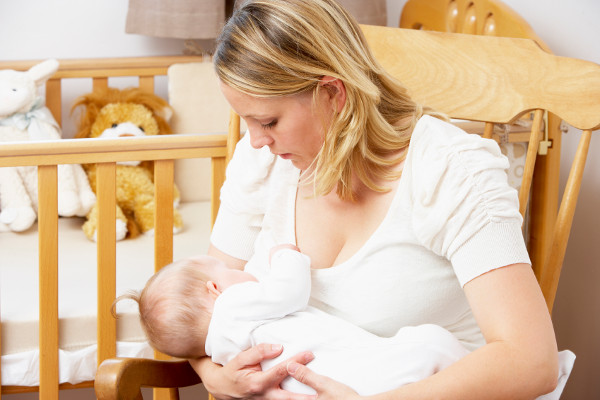
A runny nose in a child of 6 months cannot be physiological, it is often caused by viruses or allergies. As a complication, bacteria can join viruses, and then the snot acquire a yellow or green tint, it is almost impossible without the use of antibiotics.
Since nasal mucus is a barrier to the penetration of infection through the nasal passages, with any decrease in immunity, the body's reaction will be excessive secretion of snot. That is why, with hypothermia in a baby, as well as with teething, the first reaction of the body will be rhinorrhea.
However, not always an abundant flow from the nose turns into a runny nose, it is enough to pump out mucus in time to restore nasal breathing and warm the nose with dry heat of a compress, as the symptoms disappear the next day.
Baby care
To cure a runny nose and crumbs, one should not always resort to cardinal methods using drugs. If you follow all the recommendations for caring for the baby during a runny nose, the ailment will pass without consequences and complications in 6 to 7 days.
Compliance with the drinking regime
Even if the baby is breastfed in the summer or during illness, he needs to be given clean drinking water, which helps to eliminate toxins produced by viruses or bacteria, and also maintains the water balance in the body. In order to find out how much water you need to give a 6 month old baby, you should multiply the baby's weight by 0.05 and subtract the volume of breast milk consumed per day from the resulting figure. In order not to bother with detailed calculations, since it is not so easy to calculate the volume of breast milk, you can simply give the crumbs 5-6 teaspoons of water during the day between feedings.
No fruit drinks and compotes
Many mothers have heard about the healing power of berry fruit drinks or raspberry and currant compotes, and try to treat a cold in a 6 month old baby, strengthening the immune system in this way. However, it is worth remembering that red berries are very allergens and immunity in a weakened state of a cold can perceive them in the body as a conditionally hostile substance, which will lead to the development of an allergic reaction.
Yes to walks in the fresh air
It is not worth canceling daily walks because of a runny nose, unless the weather is calm outside and there is no rain or frost. Fresh air will facilitate nasal breathing and moisturize the mucous membranes, which will promote recovery.
Indoor microclimate creation. In the room where the baby is 6 months old, the air should be slightly cool, fresh and well humidified. In order to make the climate milder, even in a city apartment, a humidifier should be used.
Cleansing the nasal passages
The baby's nose is clogged, not only because the mucous membrane is inflamed, an accumulation liquid snot, which a baby of 6 months is not yet able to blow his nose on his own, also block nasal breathing.
To alleviate the baby's condition and prevent the addition of a bacterial infection, the nasal passages should be cleaned as needed, as well as after sleep and before feeding. This can be done using a rubber aspirator.
Moisturizing the mucous membrane
After the nose is cleaned and can breathe again, the mucous membrane should be moistened with saline or special drops for babies based on sea water. It should be remembered that with an excess of solution, it will drain into the oropharynx and cause a burning sensation. If this happens, you should give the child a drink of water. In the event that the mucous membrane is too dry, you should carefully grease it with peach or linseed oil, using cotton tows for this.
Procedures
It is possible to alleviate the baby's condition and speed up recovery by applying warming up with dry compresses. Such procedures eliminate inflammatory processes at the beginning colds, increase the flow of blood, thereby eliminating congestion and swelling.
Compresses
To prepare such compresses, heat the salt in a frying pan and pour it into a tight terry sock. A 6 month old baby has a much higher skin sensitivity than an adult, so before applying a compress to a baby, you should check its temperature by applying it to your eyelids.
Inhalation
Treatment with inhalation also promotes recovery. However, you should not do this procedure without a doctor's recommendation. At first glance, harmless procedure, in the presence of dried mucus in narrow respiratory tract 6 month old baby, promotes its swelling and leads to obstruction. Therefore, independently, without special indications, it is impossible to treat children under 5 years of age with steam.
Drug treatment
The use of serious drugs, such as vasoconstrictors, antiseptics, hormonal or antibiotics, is indicated only for complicated rhinitis and only as directed by a doctor. But as a rule, a simple runny nose can be treated using only moisturizing drops Aqua Maris, Humer, No-salt for children. When a bacterial infection is attached, the pediatrician can prescribe Protargol or Sialor, but they should be used no more than 4 days and carefully observing the dosage. Antibacterial drops Pinosol also well eliminate snot, but it is not worth treating children under 3 years old with it, since it contains essential oils that can provoke oil pneumonia.
For flu and colds, pediatricians recommend treating a cold with antiviral drops Grippoferon or Interferon. However, this technique is unjustified by the great risks of disrupting the functioning of the immune system, because the introduction of synthetic interferon leads to the fact that the immune system reduces the production of its own protective substance.
In most countries with developed medicine, the use of various antiviral and immunostimulating drugs is permissible only for very serious infections or if the child is very weak and is not able to overcome the virus. Our pediatricians write prescriptions for such popular drugs at any opportunity and even as a preventive measure, which is an absolute crime against children's health.
